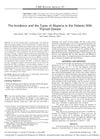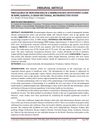 November 2017 in “Research Journal of Health Sciences”
November 2017 in “Research Journal of Health Sciences” Skin infections and eczema were most common in all ages, acne in teens and young adults, and nutritional skin problems and infestations in children.
 February 2016 in “Evidence Based Women Health Journal (Online)”
February 2016 in “Evidence Based Women Health Journal (Online)” Women with PCOS had higher SRAGE levels, possibly linked to BMI, not PCOS.
 May 2009 in “Endocrinologist”
May 2009 in “Endocrinologist” Women with thyroid disease are more likely to experience female pattern hair loss, especially if they've had thyroid disease for a long time.
 June 2008 in “British Journal of Dermatology”
June 2008 in “British Journal of Dermatology” UK medical students lack dermatology education, liver biopsy patients with risk factors show more fibrosis, and certain fungi resist drugs due to melanin; genetics may influence female hair loss.
 September 2002 in “Fertility and sterility”
September 2002 in “Fertility and sterility” Female relatives of PCOS patients have a higher chance of showing PCOS symptoms.
 233 citations,
November 2002 in “The journal of investigative dermatology/Journal of investigative dermatology”
233 citations,
November 2002 in “The journal of investigative dermatology/Journal of investigative dermatology” Creating stronger blockers for skin enzymes might lead to better treatment for conditions like acne and excessive hair growth.
 97 citations,
November 1986 in “Journal of Steroid Biochemistry”
97 citations,
November 1986 in “Journal of Steroid Biochemistry” Antiandrogens affect androgen-dependent body functions and are used for various medical conditions, with some risks like fetus feminization, but new forms like 17α-propylmesterolone show promise for acne without systemic effects.
 69 citations,
November 2010 in “Middle East Fertility Society Journal”
69 citations,
November 2010 in “Middle East Fertility Society Journal” PCOS affects women's health by increasing the risk of diabetes, heart disease, and reproductive issues.
 67 citations,
September 2008 in “Dermatologic therapy”
67 citations,
September 2008 in “Dermatologic therapy” Hirsutism is excessive hair growth in women often caused by polycystic ovarian syndrome, and identifying the cause is important for managing associated health risks.
 63 citations,
March 2011 in “Clinical Endocrinology”
63 citations,
March 2011 in “Clinical Endocrinology” Evaluate postmenopausal women with high androgen levels using medical history, physical exams, lab tests, and imaging to manage health risks.
 37 citations,
November 1995 in “Journal of Investigative Dermatology”
37 citations,
November 1995 in “Journal of Investigative Dermatology” Topical finasteride and flutamide reduce gland size and enzyme activity, with flutamide being more potent, potentially treating acne, seborrhea, hirsutism, and androgenic alopecia.
 30 citations,
November 2018 in “Fertility and Sterility”
30 citations,
November 2018 in “Fertility and Sterility” Young women with PCOS have a higher risk of high blood pressure and metabolic syndrome, but these risks may decrease after age 40.
 21 citations,
August 1994 in “Clinical endocrinology”
21 citations,
August 1994 in “Clinical endocrinology” 5α-Reductase inhibitors can help treat hair loss, acne, and prostate issues by reducing DHT levels.
 18 citations,
January 2017 in “Journal der Deutschen Dermatologischen Gesellschaft”
18 citations,
January 2017 in “Journal der Deutschen Dermatologischen Gesellschaft” High and low doses of prednisolone helped 62% of children with severe alopecia regrow hair with some weight gain and mild acne as side effects.
 18 citations,
January 2013 in “Postepy Dermatologii I Alergologii”
18 citations,
January 2013 in “Postepy Dermatologii I Alergologii” Puberty often causes skin issues like acne and excessive sweating, and treatments require patience as results may vary.
 16 citations,
May 2019 in “International Journal of Women's Dermatology”
16 citations,
May 2019 in “International Journal of Women's Dermatology” The new FDA labeling rules provide more detailed drug safety information for pregnant and breastfeeding women, but more data is needed on the risks of many dermatologic drugs.
 13 citations,
December 2020 in “Dermatologic Therapy”
13 citations,
December 2020 in “Dermatologic Therapy” Sebaceous glands in our skin, developing during pregnancy and active in puberty, produce sebum for skin lubrication, temperature control, and fighting germs, also help in hormone regulation, and their dysfunction can cause conditions like acne and hair loss.
 10 citations,
January 2019 in “The Nurse Practitioner”
10 citations,
January 2019 in “The Nurse Practitioner” PCOS is a common hormonal disorder in women, treated with lifestyle changes, medication, and patient education.
 9 citations,
August 1952 in “The Journal of Clinical Endocrinology & Metabolism”
9 citations,
August 1952 in “The Journal of Clinical Endocrinology & Metabolism” A 17-year-old female with adrenogenital syndrome produces very high levels of androgens, which prevent complete feminization despite high estrogen doses.
 2 citations,
January 2017
2 citations,
January 2017 PCOS is a common hormonal disorder in women that can lead to various health issues and requires comprehensive management.
 1 citations,
March 2011 in “Informa Healthcare eBooks”
1 citations,
March 2011 in “Informa Healthcare eBooks” Isotretinoin is a preferred treatment for severe acne, often leading to long-term improvement, but requires careful monitoring due to potential side effects.
 April 2024 in “Indian Scientific Journal Of Research In Engineering And Management”
April 2024 in “Indian Scientific Journal Of Research In Engineering And Management” PCOS affects many women and requires early detection and symptom management.
 January 2016 in “Journal of the turkish academy of dermatology”
January 2016 in “Journal of the turkish academy of dermatology” Acne was the most common skin problem in kids, with other conditions like warts and eczema also frequent, varying by age and gender.
 July 2015 in “Journal of evolution of medical and dental sciences”
July 2015 in “Journal of evolution of medical and dental sciences” The most common skin diseases found were contact dermatitis, scabies, fungal infections, urticaria, and acne, highlighting the need for better public health policies and awareness.
 January 2003 in “Elsevier eBooks”
January 2003 in “Elsevier eBooks” Androgens and other hormones affect hair growth and skin conditions like acne.
 September 2018 in “Fertility and Sterility”
September 2018 in “Fertility and Sterility” African American women have a higher risk of preterm delivery than Caucasian women, and inflammatory stimuli affect gene expression in cells related to PCOS, showing a heightened inflammatory state in women with PCOS.
 205 citations,
July 2009 in “Journal of Dermatological Science”
205 citations,
July 2009 in “Journal of Dermatological Science” Male and female skin differ in many ways, which could lead to gender-specific skin treatments.
 71 citations,
August 2019 in “The journal of sexual medicine”
71 citations,
August 2019 in “The journal of sexual medicine” Testosterone treatment effectively causes male physical development in transgender male adolescents but may lead to side effects like acne, higher BMI and blood pressure, lower good cholesterol, and decreased bone density.
 34 citations,
February 1993 in “Journal of steroid biochemistry and molecular biology/The Journal of steroid biochemistry and molecular biology”
34 citations,
February 1993 in “Journal of steroid biochemistry and molecular biology/The Journal of steroid biochemistry and molecular biology” Certain 4-azasteroids are effective at blocking the enzyme that processes testosterone in human skin and could help treat acne, excessive hair growth, and male pattern baldness.
 29 citations,
January 2011 in “Journal of Obstetrics and Gynaecology”
29 citations,
January 2011 in “Journal of Obstetrics and Gynaecology” Insulin resistance in women with PCOS can lead to serious health issues, but lifestyle changes and certain medications can help manage symptoms.






























